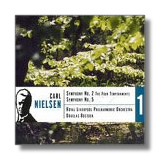
The Internet's Premier Classical Music Source
Related Links
- Nielsen Reviews
- Latest Reviews
- More Reviews
-
By Composer
-
Collections
DVD & Blu-ray
Books
Concert Reviews
Articles/Interviews
Software
Audio
Search Amazon
Recommended Links
Site News
 CD Review
CD Review
Carl Nielsen

Symphonies #2 & 5
- Symphony #2 "The Four Temperaments" Op. 16 (1902)
- Symphony #5, Op. 50 (1922)
Royal Liverpool Philharmonic Orchestra/Douglas Bostock
Classico CLASSCD 296 64:40 DDD
The is the first volume in this Danish label's new Carl Nielsen Edition. Since 1994, new performance editions of Nielsen's scores have been in preparation. These editions are correcting mistakes that crept into the earliest printed scores, and also will reflect changes that the composer subsequently made to these same scores. Listeners probably won't notice any changes to the Second Symphony, because most of the corrections are minor, and many already have been reflected in the orchestral parts anyway. More has been done to the score of the Fifth Symphony. In the 1950s, prominent Nielsen conductor Erik Tuxen prepared a new edition of this score and fixed some of the obvious mistakes that had been present in the previous edition. However, he also made some unauthorized changes to scoring and dynamics to buttress passages that he had thought weak. The new Carl Nielsen Edition removes these unauthorized changes, and it's clear that there's nothing wrong with Nielsen's original thoughts for which a good recording can't compensate. This, then, is Nielsen without the second-guessing.
This would all be for naught if Bostock and the RLPO weren't so masterful. Bostock is a Boult pupil, and he shows his teacher's concern for the communicative power of the music. It was as if I was hearing these scores for the first time without being separated from them by an invisible wall. The Fifth Symphony can be a difficult score to digest, partly because of its episodic two-movement format. Bostock conducts it tautly, and the music has rarely sounded more melodic or more dramatic, or, for that matter, more coherent. The Second Symphony is such a winning score that one might think it almost conducts itself, and there isn't a recording of it that really dissatisfies me. Some are more exciting than others, however, and Bostock's is the most exciting of all. Each of the four movements contains many interpretive touches that give the music-making personality and clarify Nielsen's score; there's no question of self-indulgence on the podium here. For example, in the second movement, Bostock emphasizes the music's phlegmatic qualities by insistently (but gently) emphasizing the downbeats. "Isn't inertia hard to overcome?," Nielsen and Bostock seem to say.
This CD's success is equally due to the RLPO, whose members play Nielsen's music with the commitment of new converts. The brass section is memorably fine, and the engineering also helps to make the most positive impression. The clarinet soloist (Nicholas Cox) also deserves to be mentioned for successfully conquering the frightening challenges that Nielsen sets in the Fifth Symphony.
This is a rewarding and personable CD in every way, and I am looking forward to hearing more Nielsen from Bostock and the RLPO.
Copyright © 2000, Raymond Tuttle


















